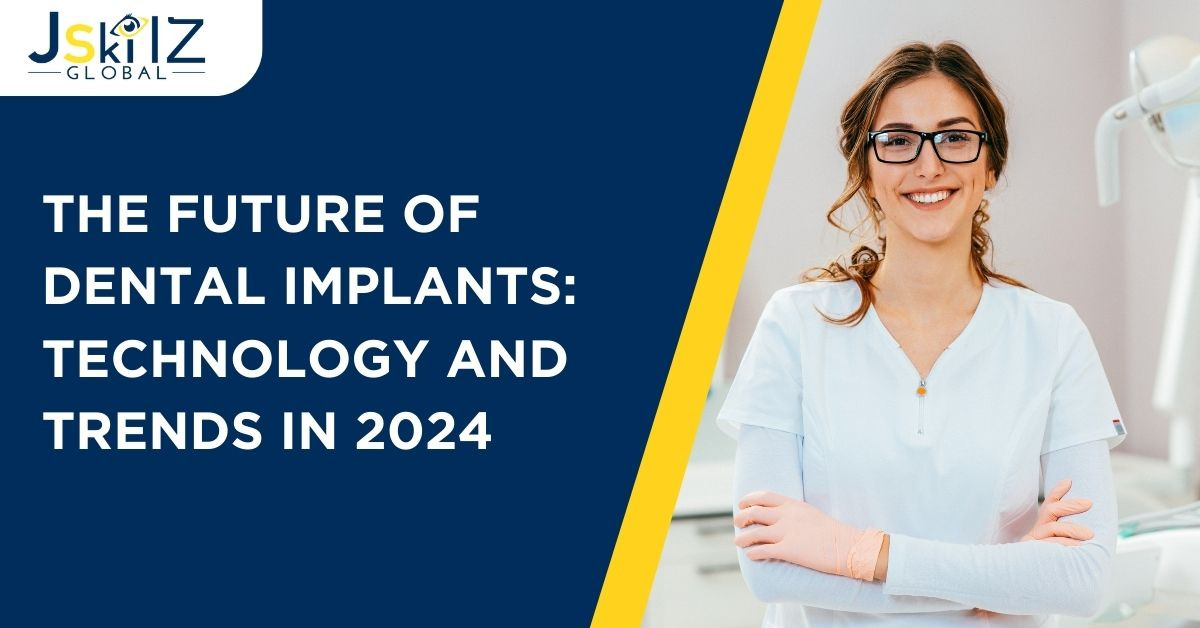THE FUTURE OF DENTAL IMPLANTS: TECHNOLOGY AND TRENDS IN 2024

THE FUTURE OF DENTAL IMPLANTS: TECHNOLOGY AND TRENDS IN 2024
The technology of dental implant is a common practice as tooth loss is a very common issue. The research into dental implant designs, techniques and materials has grown in recent years, and will continue to grow in the future. However, there are still many things to be done to improve long-term results of treatment.
New Trends In Dental Implants: 2024
Dental implants have revolutionized how we enhance our oral health and restore smiles. New trends are emerging as technology and research advance, shaping the future in dental implantology.
In this blog you will deeply explore the latest dental implant trends, and shed light on latest 2024 innovations which make smiles more brighter, and dental procedures easier to access.
1. Guided Implant Surgery - A Path to Accuracy:
It is a revolutionary trend in dental implants known as “guided implant surgery”. This technique creates a surgical map based on digital imaging, which provides a detailed plan for implant placement. It not only improves accuracy but also decreases time for surgery.
2. Digital Impressions for accurate precisions:
Dental impressions are not so precise and can be uncomfortable. Digital impressions are the new trend for dental implants. They're faster, more precise, and more comfortable. This technology allows the dentist to create a 3-D model of the mouth. It ensures a perfect fit with the dental implants.
3.Smart Implants: Combining technology with oral health:
Dental implants have not been left behind in the age of intelligent technology. Smart implants with sensors and monitoring abilities are becoming a popular trend in dentistry.
These implants provide both dentists and patients with real-time information on oral health. This proactive approach allows early detection of issues and promotes long-term success.
4.3D printing: Limitless customization:
The 3D printing revolution has impacted many industries. Dentistry is no different. Dental Implants are now custom-designed, and can be 3D printed according to the unique anatomy of each patient. This level of customization allows for a better fit, a more natural feeling, and improved aesthetics.
5. Faster procedure:
In the past, implant procedures have required a period of waiting between the implant placement and the attachment to the prosthetic teeth. Faster procedure ensures the same-day implantations that are becoming more popular. The advancements in implant materials and design have allowed patients to devote less time in the clinic and utilize the same time for some other productive tasks.
6. Biocompatible materials: Harmony with your body:
Modern dentistry is concerned with biocompatibility, particularly in the case of dental implants. Biocompatible materials such as zirconia or titanium are the latest trend, which ensures that implants blend seamlessly with the natural bone structure of the patient. It not only increases the success rate, but also lowers the risk for allergic reactions.
It's evident that innovation and technology are advancing in the field of dental implants. They're advancements in the field of dental implants that make it more efficient, comfortable and personalized.
New Trends In Dental Implants: 2024
Technology enhances accuracy and predictability from diagnosis to actual procedure. 3D imaging, for example, provides a detailed picture of the oral structure. This allows better planning and placement accuracy.
The progress of dental implant technology is largely influenced by the use of technology. The CAD/CAM system allows for the creation of custom-made implant prosthetics which blend in seamlessly with natural teeth.
With the introduction of new technologies such as virtual reality and AI, the future is even more exciting. Researchers are striving to offer the best possible care for future patients.
A technology for dental implants using ultraviolet (UV), light is also possible due to advancements in the technology that is now been developed.
Researchers from the UCLA School of Dentistry developed this technology. The new technology is said to have faster healing times and a 'near perfect' Osseo integration. It also reduces complications for the patients.
Researchers identified an important obstacle to the advancement of implant technology. Researchers found that hydrocarbons are naturally deposited on the titanium surfaces of pellicle implants, which can both inhibit osseo integration as well as lead to periimplantitis for 35-40% patients.
Researchers developed a new technology that involves blasting ultraviolet light on titanium implants for a minute. The UV light eliminates hydrocarbons and reduces the risk of complications after treatment.
This technology allows for a more flexible occlusion, which in turn reduces the number of bridges needed and the size of the implant crowns. The UV treatment also causes the gingival cell to perform an 'unprecedented' action in sealing the implants. This reduces the risk of peri-implantitis and bacterial infection.
Hope you like the article.
Have a great day!










